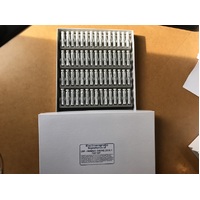LWP Animals: Canine (Dog) Test Kit
60 vials, boxed
Vial Size: 10 x 50mm
Box Type - White flat tray cardboard box with cell inlay structure for the vials.
A range of vials specifically related to dogs, including healthy tissues, diseases, tumours, parasites, vaccinations and others.
AC 01 Bladder Healthy Tissue
AC 02 Cardiac Muscle Healthy Tissue
AC 03 Duodenum Healthy Tissue
AC 04 Ileum Healthy Tissue
AC 05 Kidney Healthy Tissue
AC 06 Liver Healthy Tissue
AC 07 Lymph Node Healthy Tissue
AC 08 Oesophagus/Esophagus Healthy Tissue
AC 09 Pyloric stomach Healthy Tissue
AC 10 Basal Cell Carcinoma Tumour
Develop at the outer layer of skin; fairly common, especially in middle-aged and older animals; usually benign, but occasionally malignant.
AC 11 Histiocytoma Tumour
A benign skin tumour that originates in the Langerhans cells, immune cells that function to provide protective immunity to the tissues that are in contact with the outer environment -- the nose, stomach, intestines and lungs, but mainly the skin's surface.
AC 12 Mammary Cancer Tumour
AC 13 Keratoacanthoma Tumour
Benign tumour of the hair follicle.
AC 14 Mast Cell Tumour Tumour
Tumour on or under the skin. Boxers, bulldogs, pugs, and Boston terriers appear to be more susceptible than other breeds.
AC 15 Melanoma Tumour
Can be either malignant or benign; common sites are mouth or toes. Male dogs and some breeds (Scottish terriers, Cocker Spaniels, Gordon Setters, Chow Chows, and Golden retrievers) appear to be more susceptible.
AC 16 Osteocarsoma Tumour
The most common bone tumour found in dogs. Bone cancer can affect any breed of dog, but it is more commonly found in the larger breeds.
AC 17 Sebaceous Adenoma Tumour
Benign tumour of the skin.
AC 18 Squamous Cell Carcinoma Tumour
Malignant skin cancer.
AC 19 Distemper / Hardpad Nosode
Affects the gastrointestinal, respiratory, and central nervous systems; can cause an abnormal enlargement or thickening of the pads of an animal’s feet.
AC 20 Hepatitis, Canine Nosode
An acute liver infection in dogs caused by canine adenovirus type-1 (CAV-1); spread in the faeces, urine, blood, saliva, and nasal discharge of infected dogs.
AC 21 Kennel Cough / Infectious Tracheobronchitis Nosode
Respiratory infection caused by Bordetella bronchiseptica and canine parainfluenza virus. These pathogens attack the cilia lining the respiratory tract and cause inflammation of the upper airway.
AC 22 Kennel Cough, Distemper, Leptospirosis, Parvovirus Infection, Hardpad and Hepatitis Nosode
AC 23 Ringworm Nosode
AC 24 Canine Parvovirus Type 2 / CPV2 Virus
A highly contagious virus that causes acute gastroenteritis.
AC 25 Microsporum Canis Fungus
Common cause of ringworm; 20% of ringworm cases in the USA are due to this organism.
AC 26 Microsporum Gypseum Fungus
Very common cause of ringworm; 70% of ringworm cases in the USA are due to this organism.
AC 27 Trichophyton mentagrophytes Fungus
Causes ringworm; 10% of ringworm cases in the USA are due to this organism.
AC 28 DHLPPi Vaccination Vaccination
Against Canine Distemper, Hepatitis, Leptospirosis, Parvovirus and Parainfluenza.
AC 29 DHPPi Vaccination Vaccination
Against Canine Distemper, Hepatitis, Parvovirus and Parainfluenza.
AC 30 Leptospirosis Vaccination Vaccination
Leptosirosis is caused by a bacteria spread through soil, water, and the urine of infected animals, and if not caught early it can be deadly.
AC 31 Kennel Cough Vaccination Vaccination
AC 32 Lyme Disease Vaccination Vaccination
AC 33 Parvovirus Vaccination Vaccination
AC 34 Rabies Vaccination Vaccination
AC 35 Ancylostoma Caninum / Hookworm, Adult Parasite
One of the most common intestinal parasites; found in warm and temperate climates. Can cause severe disease including aneemia and serious diarrhoea; growth in young animals is stunted, and the hair coat may appear dull and dry. In severe infestations, animals may cough. or develop pneumonia.
AC 36 Angiostrongylus Vasorum / Dog Lungworm / French Heartworm Parasite
Usually causes progressively worsening signs of cardiac and respiratory disease, as well as causing haemorrhages in lungs, liver, intestine, eyes and spinal cord; if left untreated, it can be fatal in severe cases.
AC 37 Babesia Canis Parasite
Fever, weakness, lethargy, pale gums and tongue, red or orange urine, jaundice, enlarged lymph nodes and enlarged spleen.
AC 38 Babesia Gibsoni Parasite
Fever, weakness, lethargy, pale gums and tongue, red or orange urine, jaundice, enlarged lymph nodes and enlarged spleen.
AC 39 Babesia Vulpes / Babesia Microti / Theieria Microti Parasite
Anemia as the immune system destroys infected red blood cells, but Babesia can have other effects throughout the body as well. Found in North America and Europe.
AC 40 Clonorchis Sinensis Parasite
Clinical signs in dogs are usually absent, but migration of immature flukes can cause acute hepatitis and pancreatitis. Mainly S E Asia.
AC 41 Cryptosporidium Parvum Parasite
Causes fever and diarrhoea; dogs may also display intolerance for food, exhibit lethargy, intolerance for exercise and weakness.
AC 42 Ctenocephalides Canis / Dog Flea Parasite
Causes fever and diarrhoea; dogs may also display intolerance for food, exhibit lethargy, intolerance for exercise and weakness. Found worldwide.
AC 43 Demodex Canis / Dog Mange Mite Parasite
Microscopic normal inhabitants of dog skin; usually not a problem, but sometimes leads to the skin condition mange or demodicosis.
AC 44 Dipylidium Caninum / Tapeworm, Eggs, Immature and Mature Proglottid Parasite
Most common tapeworm in dogs; in puppies heavy tapeworm infestation can cause lack of growth, anaemia and occasionally intestinal blockages; dogs may scoot anus across the ground because of the irritation.
AC 45 Dirofilaria Immitis / Dog Heartworm Parasite
Causes damage to heart and lungs, usually as a result of a bite from an infected mosquito.
AC 46 Echinococcus Granulosus / Hydatid Worm / Hyper Tape-Worm / Dog Tapeworm Parasite
Symptoms include itching / licking around the anus, weight loss, lethargy and painful abdomen; distributed world-wide. It is especially prevalent in parts of Eurasia, north and east Africa, Australia, and South America.
AC 47 Echinococcus Multilocularis / Tapeworm Parasite
Mostly without clinical signs, unless in case of very heavy infections, which are unusual.
AC 48 Giardia Lamblia, Cysts and Trophozoites Parasite
Causes diarrhoea, although majority of dogs are symptom-free.
AC 49 Heterodoxus Spiniger / Dog Chewing Louse Parasite
Female lice attach their eggs (nits) to the hairs of the host dog; once hatched the nymphs, bite and feed on blood. Lice can also feed on dead skin and hair. This feeding activity affects the dog by causing hair loss, reduced skin integrity and itching.
AC 50 Isospora Spp./Cystoisospora Spp., Oocysts and Adult Parasite
infect the intestines in dogs and can cause disease (intestinal or enteric coccidiosis); can cause bloody or watery diarrhea, weight loss, dehydration, and, in more serious cases, anorexia, vomiting, and depression. In severe cases, intestinal coccidiosis can be fatal.
AC 51 Leishmania Donovani Parasite
Symptoms may include sores, loss of weight, bald patches, conjunctivitis, , nasal discharge, muscular atrophy, inflammation, swelling, and organ failure, including mild heart attacks.
AC 52 Otodectes Cynotis / Ear Mite Parasite
Tiny parasite that lives out their life cycle mostly inside the ear canal. They are quite common and can cause severe irritation and itchiness of the ears.
AC 53 Sarcoptes Scabiei Parasite
A highly contagious mite infestation, causing intense itching.
AC 54 Strongyloides Stercoralis Parasite
Symptoms include rash, cough, diarrhoea, blood and mucous in stools.
AC 55 Taenia Psiformis / Tapeworm Parasite
Normally no clinical signs seen for low to moderate infections; in highly infected cases the dog will experience blockage in the intestines.
AC 56 Toxascaris Leonina, Egg and Larvae Parasite
A common parasitic roundworm; may show no symptoms; may have diarrhoea, vomiting, loss of appetite, experience thinning, dull coats, and in puppies, can develop distended abdomens.
AC 57 Toxocara Canis / Dog Roundworm, Cysts and Trophozoites Parasite
Can be fatal in puppies, but adult dogs are usually symptom-free.
AC 58 Trichodectes Cani / Dog Biting Louse / Canine Chewing Louse Parasite
Found throughout the world; often asymptomatic, but can be very irritating in heavy infestations; may be a carrier of dog tapeworm.
AC 59 Trichuris Trichiura Parasite
May be symptom free; weight loss, diarhoea, mucous or blood in the stools and anaemia.
AC 60 Trichuris Vulpis / Whipworm, Eggs Parasite
Eggs hatch in small intestine, and dog asymptomatic; in adult form causes bloody diarrhoea, weight loss, dehydration, and anaemia.
(TKanC)
| SKU | TKanC |
| Brand | Life Work Potential |
Be The First To Review This Product!
Help other Equilibrium Kinesiology Supplies users shop smarter by writing reviews for products you have purchased.



















